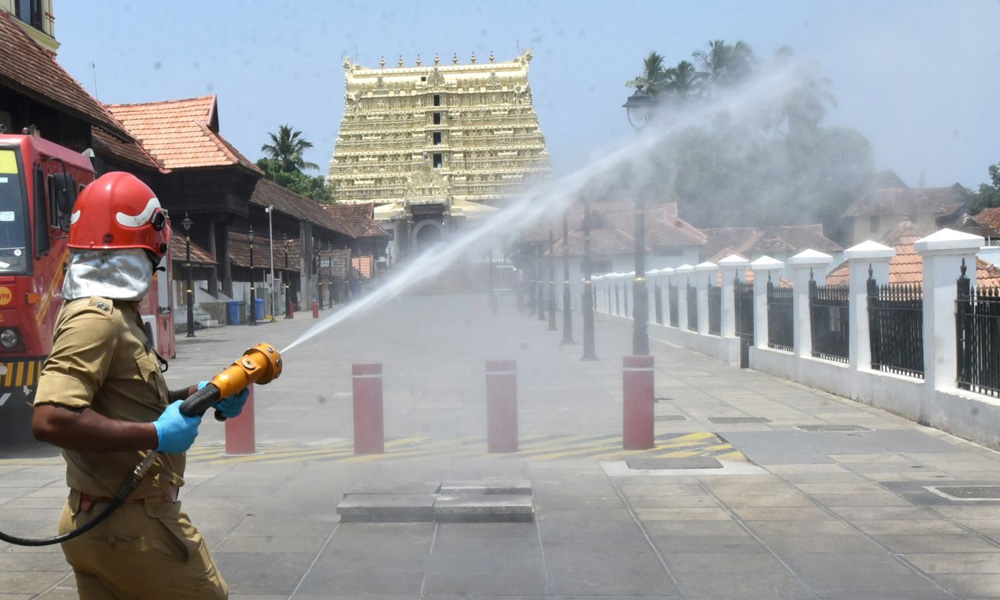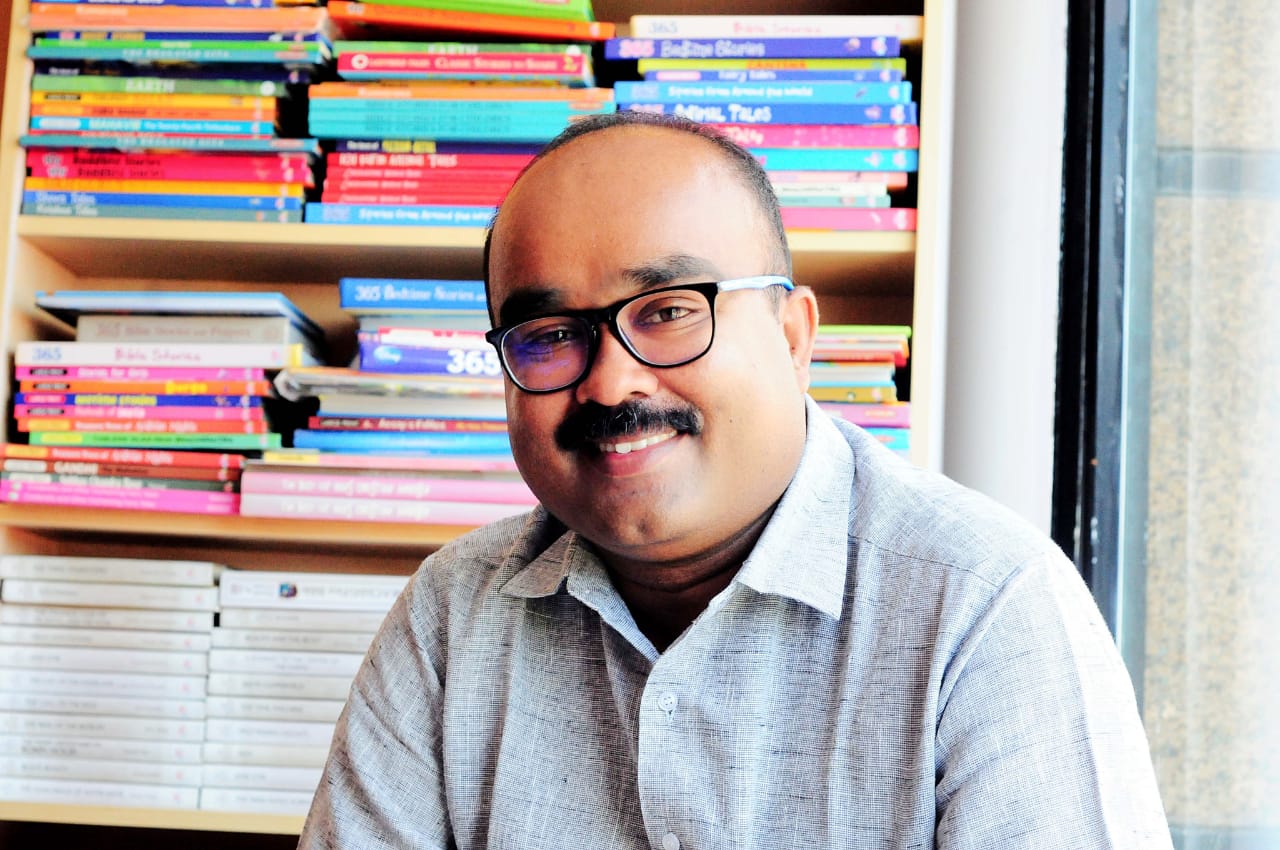
A Brutal And Inhuman Tax-Regime And The Hidden Assets Of Kerala's Padmanabhaswamy Temple
Kerala, 23 July 2020 12:59 PM GMT | Updated 24 July 2020 9:55 AM GMT
Creatives : Abhishek M |
" An engineer by profession, Abhishek is the creative producer of the team, graphic designing is his passion and travelling his get away. In more ways than one, he makes the content visually appealing."
Princely state of Travancore where the richest temple of India is located, had a history of inhuman taxes including breast tax targeting marginalised women. The usurped resources of Travancore poor and disempowered have been deposited in the secret vaults of the temple.
History may not have any official records of her existence. And martyrdom of this brave woman against one of the weirdest taxes in the entire history of humankind may be yet another local legend. But the popular narrative of Nangeli who cut her breasts off believed to be during early part of 19th century in the then princely state of Travancore to assert her right to cover the chest without paying the infamous breast-tax is reflective of the horrible, inhuman, oppressive and caste-ridden governance that existed once in the southern portion of present day Kerala. As historians have always pointed out, a brutal and hegemonic tax system was prevalent in Travancore and it had always targeted the weak. In the case of Nangeli, she belonged to Ezhavas, a backward community with a working class mass base.
Whatever be the truth behind Nangeli's legend, historians confirm that breast tax was in existence in Travancore for long and it had always targeted women from the disadvantaged segments of the society. Women from lower castes were barred from covering their breasts and any violation invited huge taxes. Tax collectors deputed by the royal family used to visit lower caste households to measure the breasts and levy the tax accordingly.
Censored Photo: A Thiyya/Tiyya family, 1900s. (Edgar Thurston)
As per prevalent narratives, Nangeli who believed to be a native of Cherthala in present Alappuzha district of Kerala had protested against the disgusting tax by covering the chest and refusing to pay the tax. When the tax collector heard about her decision, he went to her house and directed her to stop breaking the law. Nangeli refused to oblige and cut her breasts off in protest. Popular legend is that it was Nangeli's sacrifice that benefited all the women of Travancore by forcing the King to roll back the breast-tax.
``The breast-tax was applicable only to women from backward castes and Dalits. Voyeuristic upper caste men with the backing of all-powerful Travancore royal family had supported this tax system that was in place for more than three centuries. As far as the royal family of Travancore was concerned, breast-tax was only one among the more than 300 weird taxes that existed in the princely state for long. They all were discriminatory and inhuman,'' points out V S Revathy, who researched under Kerala university on the system of tax payment existed in Travancore.
According to Revathi, there was a tax named Kathi Pattam (Knife Tax) and it targeted traditional toddy tappers of Travancore who use a particular kind of knife. Yet another discriminatory tax was Vasthra Pattam which collected huge sums from washermen. Thattan Pattam targeted blacksmiths and Neerkooli (water tax) was applicable to all those who hailed from backward classes. Brahmins were always exempted from these taxes and the simmering discontentment among the backward classes had resulted in famous protests against the discriminatory royal family's tax system like Channar, Villuvandi, Kallumala and Mookkunni rebellions, which sowed seeds of social justice movement eventually in the princely state.
``All the treasures that make Thiruvananthapuram's famous Sree Padmanabhaswamy Temple as one among the richest centres of worship in the country are the creations of this brutal and discriminatory tax system that exempted nothing other than Brahmanic. For the poor and backward, everything from land and seed to animals and artisan skills have been taxed severely. The usurped resources of Travancore poor and disempowered have been deposited in the secret vaults of the temple over the years by the royal family which consider Padmanabhaswamy as its presiding deity. The temple saga is one of historical injustice,'' says Revathy.
The temple has created headlines last week when a two-judge Supreme Court bench overturned an earlier Kerala High Court decision that took away the rights of Travancore royal family in the controlling and managing of the centre of worship located at East Fort in Thiruvananthapuram. As per a covenant signed by princely state of Travancore with the Union of India in 1949, the royal family had the rights to control the management of the temple. But Kerala High Court had cited the 26th Amendment to the Constitution that came into existence in 1971 abolishing all royal titles. The High Court had observed that the amendment had facilitated a social situation in which no royal family was in existence and in the absence of any royal family the administrative control of the temple would naturally go to the state government. However, the Supreme Court has now observed that the 26th Amendment did not impugn the rights of the Travancore royal family in the case of the temple.
According to academic and writer Dr T T Srikumar, the Supreme Court order has opened up larger questions about the polity and society envisaged under a constitutional democracy. "The ternary system is dividing society into the clergy, the nobility and third estate – common people. It also gives exclusive powers and privileges to the clergy and nobility within the feudal system. Democracy is duty bound to systematically dispensing with such feudal remnants and viewed from that perspective, the SC decision in favour of granting administrative rights to the descendants of former Travancore royalty in matters related to the Padmanabha temple is a retrograde step," he says. Democratic institutions have a responsibility to progressively annihilate the ternary division of the society, which is a toxic vestige of feudalism, he further says. Even T P Sankaran Kutty Nair, official historian of the temple, had confirmed that most of its wealth was the outcome of the discriminatory tax system prevalent in Travancore. For reasons known to them, the kings used to deposit their surplus wealth, collected as tax in the secret vaults of the temple.
Situated in an eight-acre plot, the temple has an 18-feet idol of Padmanabha, an incarnation of Lord Vishnu, in a reclining pose. It has huge towers and fortress-like walls which are built in granite. Despite the huge wealth accumulated here during the days of royal dynasty rule, the COVID-19 enthused lockdown has landed the temple administration in an unprecedented crisis. Hardly a week after the court verdict which prevents any kind of transaction involving temple's assets, the temple administration is finding it difficult to manage salary and other expenses in the absence of visit by the devotees. According to temple sources, it requires Rs 1.25 crore for salary needs and Rs 45 lakh for rituals during every month. The revenue has reduced to zero from an average monthly income of Rs 1.5 crore from visiting devotees. During peak months, it used to rise to Rs 2 crore. All the 165 permanent employees of the richest temple are now facing twenty percent salary cut and the dues are turning arrears in the recent months. For the 115 temporary workers, the monthly remuneration has been reduced to Rs 5000 each.
This is happening at a time when over 1 tonne of gold, including thousands of French and Dutch gold coins; diamonds and solid gold idols and diamond-studded jewellery remain kept in vaults built five feet under the temple's grey granite floors and accessed by a short flight of four steps. It was in July-August 2011, five among the six vaults were opened as per a Supreme Court order and it revealed massive amounts of gold, diamonds, silver and other precious stones in the form of ornaments, idols, coins from different countries, and artefacts that had been stored for centuries. Though the unofficial estimate has been over Rs 1 lakh crore, it excludes the value of the antiques.
The sixth and last vault is still remaining unopened. Though the new Supreme Court order leaves its opening to the prerogative of the proposed administrative body comprising nominees of the royal family, judiciary, state government and union government, the royal family has already declared that it would not favour opening of the remaining vault. ``Let it be a secret of the god. We don't want it to be opened. The only focus is reopening the temple post COVID-19,'' said Aditya Varma, a member of the royal family when contacted.
The tough stand taken by the royal family not only prevents opening of the key vault but also prevents any kind of exploration of a bigger subterranean vault in which then Travancore rulers believed to have rolled in copper pots filled with gold coins during Malayalam month Karkidakam.
``This practice was in existence for centuries but the location of this passage is lost," claims a petition filed with the Supreme Court by late T P Sundararajan, an Indian Police Service officer of the 1964 West Bengal cadre. A hardcore devotee of Padmanabha, it was Sundararajan's prolonged legal battles demanding safekeeping of temple resources and accountability in its administration that resulted in the interventions of High Court and Supreme Court apart from the opening of secret vaults.
Stating that he had fears that the royal family members would siphon off temple treasures, Sundararajan had initiated the long legal battle which culminated in the present verdict years after his death. His fights have yielded partial victory and the present court verdict has failed to reflect his concerns.
``Kerala's political parties and state government are unanimous against filing any appeal against this verdict. For them, it's a closed chapter. But the verdict needs proper review. It suggests an all-Hindu administrative committee with Thiruvananthapuram district judge as chairperson. What would happen if a Christian, Muslim or non-believer gets appointed as Thiruvanathapuram district judge? How a secular country can choose only Hindus as district judge in Thiruvananthapuram?,'' asks N E Sudheer, writer and thinker.
``The Royal Family has received a favourable verdict from the Supreme Court that reinforces the family's involvement in the administration. The former Congress-led United Democratic Front government in Kerala had failed to convince the court about the state's complete control of the court. As a person who openly accused the royal family of making monetary gains by controlling the temple, I still feel there must be more accountability and transparency in the case of temple administration. Moreover, the remaining vault also must be opened and the hidden treasures must be properly accounted for,'' said veteran CPI(M) leader and former Chief Minister V S Achuthanandan, the lone political top figure in Kerala who extended solidarity with Sundararajan's cause.
The court order and the royal family's response to it are indicative that there would be no steps to address the question of pilferage of gold and other valuables from the secret vaults over the years. There were strong allegations that the royal family members took away gold from the vaults, especially the unopened sixth vault, misusing their privileges. However, the royal family still say the unopened vault has a mystical curse over it and opening it would be nothing short of inviting disaster to the entire state.
 All section
All section














